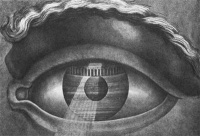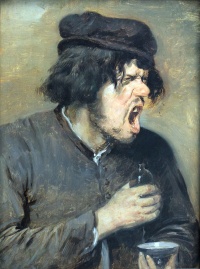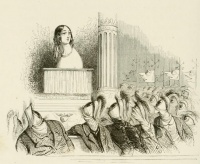Perception
From The Art and Popular Culture Encyclopedia
| Revision as of 20:39, 7 November 2008 Jahsonic (Talk | contribs) ← Previous diff |
Current revision Jahsonic (Talk | contribs) |
||
| Line 1: | Line 1: | ||
| - | [[Image:Arrival of a Train at La Ciotat, 1895.jpg|thumb|right|200px|''[[The Arrival of a Train at La Ciotat Station]]'']] | + | [[Image:The Bitter Potion.jpg|200px|thumb|left|''[[The Bitter Potion]]'' (c. 1635) by [[Adriaen Brouwer]]]] |
| + | {| class="toccolours" style="float: left; margin-left: 1em; margin-right: 2em; font-size: 85%; background:#c6dbf7; color:black; width:30em; max-width: 40%;" cellspacing="5" | ||
| + | | style="text-align: left;" | | ||
| + | "THE IDEA OF writing a book about the [[perception]] of [[odor]]s came to me as I was reading the memoirs of [[Jean Noël Hallé|Jean-Noel Halle]], a member of the [[Société royale de médecine|Societe Royale de Medecine]] under the ancien regime and the first incumbent of the chair of [[Public health|public hygiene]] established in Paris in 1794."--incipit ''[[The Foul and the Fragrant]]'' (1982) by Alain Corbin | ||
| + | |} | ||
| + | [[Image:Nicolas Ledoux.jpg|thumb|200px|This page '''{{PAGENAME}}''' is part of the ''[[sense|senses]]'' series. | ||
| + | <br><small> | ||
| + | Illustration: Drawing for the interior view of the [[Théatre de Besançon]] (1784) by [[Claude Nicolas Ledoux]]</small>]] | ||
| + | [[Image:Glass half full or half empty.JPG|thumb|right|200px|[[Is the glass half empty or half full?]], photo © [[JWG]]]] | ||
| + | [[Image:Venus at the Opera by Grandville.jpg|thumb|200px|''[[Venus at the Opera]]'' (1844) by [[Jean Ignace Isidore Gérard Grandville|Grandville]] (French, 1803 – 1847)]] | ||
| + | [[Image:Ears from 'Italian Painters'.jpg|thumb|right|200px|[[Ear]]s from ''[[Italian Painters]]'']] | ||
| {{Template}} | {{Template}} | ||
| - | '''Perception''' is the process of acquiring, organizing and interpreting sensory information. It is a major field of study in psychology and cognitive science. Methods of studying perception range from essentially biological or physiological approaches, through psychological approaches to the often abstract 'thought-experiments' of mental philosophy. -- | + | '''Perception''' (from the Latin ''perceptio, percipio'') is the [[organization]], [[identification]], and [[interpretation]] of [[Sensory system|sensory]] [[information]] in order to represent and understand the environment. All perception involves signals in the [[nervous system]], which in turn result from physical or chemical [[Stimulus (physiology)|stimulation]] of the sense organs. For example, vision involves [[light]] striking the [[retina]] of the eye, [[smell]] is mediated by [[odor]] [[molecules]], and [[hearing]] involves [[sound wave|pressure waves]]. |
| - | == By medium == | + | |
| - | [[visual perception|seeing]] - [[tasting]] - [[hearing]] - [[feeling]] - [[smelling]] | + | |
| - | == Related == | + | Since the rise of [[experimental psychology]] in the 19th century, [[perceptual psychology|psychology's understanding of perception]] has progressed by combining a variety of techniques. [[Psychophysics]] quantitatively describes the relationships between the physical qualities of the sensory input and perception. [[Sensory neuroscience]] studies the brain mechanisms underlying perception. |
| - | [[attention]] - [[experience]] - [[sense]] - [[sensation]] - [[synaesthesia]] | + | |
| + | Although the senses were traditionally viewed as passive receptors, the study of [[illusion]]s and [[ambiguous image]]s has demonstrated that the brain's perceptual systems actively and pre-consciously attempt to make sense of their input. There is still active debate about the extent to which perception is an active process of [[hypothesis]] testing, analogous to [[science]], or whether realistic sensory information is rich enough to make this process unnecessary. | ||
| + | ==Etymology== | ||
| + | From Middle English ''perceiven'', from Old French ''percevoir, perceveir'', from Latin ''percipere'', past participle ''perceptus'' (“take hold of, obtain, receive, observe”), from ''per'' (“by, through”) + ''capere'' (“to take”); see [[capable]]. Compare [[conceive]], [[deceive]], [[receive]]. | ||
| + | |||
| + | == See also == | ||
| + | * [[Action-specific perception]] | ||
| + | * [[Alice in Wonderland syndrome]] | ||
| + | * [[Apophenia]] | ||
| + | * [[Change blindness]] | ||
| + | * [[Introspection]] | ||
| + | * [[Neural correlates of consciousness]] | ||
| + | * [[Pareidolia]] | ||
| + | * [[Philosophy of perception]] | ||
| + | * [[Plant perception (physiology) ]] | ||
| + | * [[Qualia]] | ||
| + | * [[Simulated reality]] | ||
| + | * [[Simulation]] | ||
| + | ==Namesakes== | ||
| + | *''[[The Doors of Perception]]'' (1954) by Aldous Huxley | ||
| {{GFDL}} | {{GFDL}} | ||
Current revision
|
"THE IDEA OF writing a book about the perception of odors came to me as I was reading the memoirs of Jean-Noel Halle, a member of the Societe Royale de Medecine under the ancien regime and the first incumbent of the chair of public hygiene established in Paris in 1794."--incipit The Foul and the Fragrant (1982) by Alain Corbin |

Illustration: Drawing for the interior view of the Théatre de Besançon (1784) by Claude Nicolas Ledoux
|
Related e |
|
Featured: |
Perception (from the Latin perceptio, percipio) is the organization, identification, and interpretation of sensory information in order to represent and understand the environment. All perception involves signals in the nervous system, which in turn result from physical or chemical stimulation of the sense organs. For example, vision involves light striking the retina of the eye, smell is mediated by odor molecules, and hearing involves pressure waves.
Since the rise of experimental psychology in the 19th century, psychology's understanding of perception has progressed by combining a variety of techniques. Psychophysics quantitatively describes the relationships between the physical qualities of the sensory input and perception. Sensory neuroscience studies the brain mechanisms underlying perception.
Although the senses were traditionally viewed as passive receptors, the study of illusions and ambiguous images has demonstrated that the brain's perceptual systems actively and pre-consciously attempt to make sense of their input. There is still active debate about the extent to which perception is an active process of hypothesis testing, analogous to science, or whether realistic sensory information is rich enough to make this process unnecessary.
Etymology
From Middle English perceiven, from Old French percevoir, perceveir, from Latin percipere, past participle perceptus (“take hold of, obtain, receive, observe”), from per (“by, through”) + capere (“to take”); see capable. Compare conceive, deceive, receive.
See also
- Action-specific perception
- Alice in Wonderland syndrome
- Apophenia
- Change blindness
- Introspection
- Neural correlates of consciousness
- Pareidolia
- Philosophy of perception
- Plant perception (physiology)
- Qualia
- Simulated reality
- Simulation
Namesakes
- The Doors of Perception (1954) by Aldous Huxley





